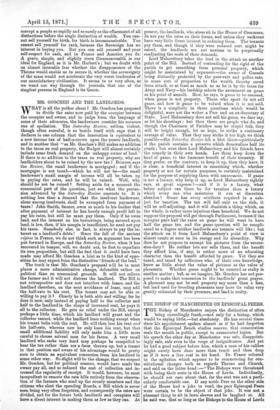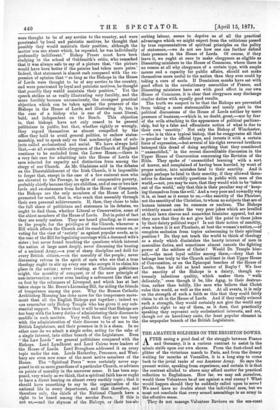THE BISHOP OF MANCHESTER ON EPISCOPAL PEERS..
THE Bishop of Manchester enjoys the distinction of often being exceedingly frank,—not only for a bishop, which would be saying little, but absolutely. He has several times since his appointment spoken almost as if he had forgotten that the Episcopal Bench studies reserve, that consecration seals the month in public, except to consecrated topics. But his speech the other day at Manchester was safe, disappoint- ingly safe, safe even to the verge of insignificance. And yet he had a good subject before him, which a man of his calibre might surely have done more than touch and then drop as if it were a live coal in his hand. Dr. Fraser referred to the agitation which appears to be commencing for con- stitutional changes both as regards Throne and Church, and said on the latter head :—" The Bishops were threatened with losing their seats in the House of Lords. Individually, he should not care about that, for the seat was.not a parti- cularly comfortable one. If any noble Peer on the other side of the House had a joke to vend, the poor Episcopal Peers were certain to be the object of that joke. It was not a pleasant thing to sit in lawn sleeves and be laughed at. All he said was, that so long as the Bishops in the House of Lords
were thought to be of any service to the country, and were penetrated by local and patriotic motives, he thought that possibly they would maintain their position, although the matter was one about which, he repeated, he was individually profoundly indifferent." Bishop Fraser must have been studying in the school of Goldsmith's critic, who remarked that it was always safe to say of a picture that, the picture would have been better if the painter had taken more pains.' Indeed, that statement is almost rash compared with the ex- pression of opinion that " so long as the Bishops in the House of Lords were thought to be of any service to the country, and were penetrated by loyal and patriotic motives, he thought that possibly they would maintain their position." Yet the speech strikes us as really illustrating very forcibly, and the more forcibly because unconsciously, the strongest practical objection which can be taken against the presence of the Bishops in the House of Lords, and illustrating it, too, in the case of a bishop who is one of the most liberal, bold, and independent on the Bench. This objection is, that bishops have not only ceased to be general politicians in public, but that, whether rightly or wrongly, they regard themselves as almost compelled by the office they hold to avoid general politics, to eschew states- manship, and to speak only on that nondescript class of sub- jects called ecclesiastical and social. We have always held that,—at all events while clergymen of the Church of England continue to be excluded from the Lower Honse,—there is a very fair case for admitting into the House of Lords the men selected for capacity and distinction from among the clergy of our Church. As Mr. Gladstone said in the debates on the Disestablishment of the Irish Church, it is impossible to forget that, except in the case of a few eminent men who are elevated to the Peerage, in spite of comparative poverty, probably chiefly because they are childless, and of one or two law lords and ex-statesmen from India or the House of Commons, the Bishops are the only members of the House of Lords promoted for merit, that is, who reach that assembly through their own personal achievements. If, then, they chose to take the full share of politicians and statesmen in its debates, we ought to find them, whether Liberal or Conservative, some of the ablest members of the House of Lords. But in point of fact they are nearly useless. They are heard pleading, as it seems to the people, for the privileges of the Church, whenever a Bill which affects the Church and its emoluments comes on, or voting for the view of 'society' as against popular needs, as in the case of the Bill for legalizing marriage with a deceased wife's sister ; but never found touching the questions which interest the nation at large most deeply, never discussing the bearing of a national Army,—a year of sharp discipline and drill for every British citizen,—on the morality of the people ; never discussing reform in the spirit of men who see that a true theology ought to stir up every one who accepts it to claim his place in the nation ; never treating, as Christian politicians might, the morality of conquest, or of the new principle of non-intervention ; never even leading a movement like that set on foot by the reformers of Liverpool, and which has at last taken shape in Mr. Bruce's Licensing Bill, for aiding the friends of temperance among the poor. Why the Roman Catholic Archbishop Manning has done more for the temperance move- ment than all the English Bishops put together ; indeed we can remember only Bishop Temple who has given it any sub- stantial support. We know that it will be said that Bishops are too busy with the heavy duties of administering their dioceses to meddle in such matters. Very well, then they are too busy with the administration of their dioceses to be of use to the British Legislature, and their presence in it is a sham. In no other case do we admit a single order, acting for the sake of a single interest, into either branch of the Legislature. Even " the Law Lords " are general politicians compared with the Bishops. Lord Lyndhurst and Lord Cairns were leaders of the House of Lords. Lord Brougham addressed it on every topic under the sun. Lords Hatherley, Penzance, and West- bury are even now some of the most active members of the House. The " Spiritual Peers " were certainly never sup- posed to sit as mere guardians of a particular Church, or advisers on points of morality in the narrower sense. It has been sup- posed, very wisely as we think, that a spiritual faith has or ought to have a direct bearing on almost every earthly topic ; that it should have something to say to the organization of the national life in every department, and that therefore, and therefore only, the chiefs of the National Church have a right to be heard among the secular Peers. If this is not so,—and the shyness of the Bishops, or their too-ab- sorbing labour, seems to deprive us of all the practical advantages which we might expect from the criticisms passed by true representatives of spiritual principles on the policy of statesmen,—we do not see how one can further defend their presence in the House of Lords. Of course, if they leave it, we ought at once to make clergymen as eligible as Dissenting ministers to the House of Commons, where there is no reason at all why clergymen of a certain type, with ample means and a capacity for public affairs, should not make themselves more useful to the nation than they ever could by taking a cure of souls. If Dominican monks have sat with good effect in the revolutionary assemblies of France, and Dissenting ministers have sat with good effect in our own House of Commons, it is clear that clergymen may discharge similar duties with equally good results.
The truth we suspect to be that the Bishops are prevented from taking a more statesmanlike and manly part in the political discussions of the House of Lords neither by mere pressure of business,—which is, no doubt, great,—nor by fear of the evils attaching to the appearance of political partizan- ship, but by a false and effeminate notion of what is due to their own sanctity.' Not only the Bishop of Winchester, —who is in this a typical bishop, that he exaggerates all that is peculiar to the official type, and invests it with a certain force of expression,—but several of his right reverend brethren betrayed this dread of doing anything that they considered " unsanctified," in the recent discreditable discussion in the Upper House of Convocation concerning the Revision of the Bible. They spoke of unsanctified learning ' with a sort of horror, and complained of having been hurried, by want of proper notice, into mistakes fatal to their sanctity. And it might perhaps be fatal to their sanctity, if they allowed them- selves to discuss worldly questions in public with men of the world,—not, you may be sure, that they would wish to be 'taken out of the world,' only that this is their peculiar way of keep- ing themselves from the evil.' And a very poor and cowardly way it is, at least as it seems to us,—the sanctity of the Pharisee, not the sanctity of the Christian, to whom no subjects that are of human interest can be common or unclean. The Bishops evidently smart under the very poor jokes which are levelled at their lawn sleeves and somewhat feminine apparel, but are they sure that they do not give half the point to these jokes by their dainty political ways ? Is not their notion of sanctity, even where it is not Pharisaic, at best the woman's notion,—of complete seclusion from topics unbecoming to their spiritual position ? Do they not teach the world to think of theology as a study which diminishes the hearty interest of men in masculine duties, and sometimes almost cancels the fighting power of the soldiers of Christ ? Would Dr. Temple him- self,—the most loyal soldier among them,—deny that he belongs less truly to the Church militant in that Upper House of Convocation, or on the Episcopal benches of the House of Lords, than he did as head master of Rugby ? We fear the sanctity of the Bishops is a dainty, though ex- tremely infectious quality, which makes them " walk delicately," even though it be, like Agag, to their destruc- tion, rather than boldly, like men who believe that Christ rules this world, as well as the next. At all events, it is only on the strength of such a faith as this that they could fairly claim to sit in the House of Lords. And if they really evinced such a strength, they would certainly not give the world any plausible right to say of them, as it does, that practically speaking they represent only ecclesiastical interests, and are, though not an hereditary caste, the least popular element in the unpopular branch of the British Legislature.



































 Previous page
Previous page